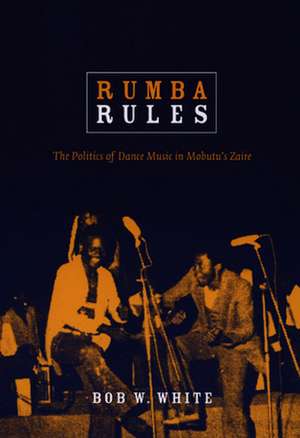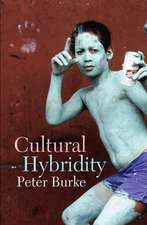Rumba Rules – The Politics of Dance Music in Mobutu′s Zaire
Autor Bob W. Whiteen Limba Engleză Paperback – 26 iun 2008
Preț: 222.58 lei
Nou
Puncte Express: 334
Preț estimativ în valută:
42.60€ • 46.29$ • 35.81£
42.60€ • 46.29$ • 35.81£
Carte tipărită la comandă
Livrare economică 21 aprilie-05 mai
Preluare comenzi: 021 569.72.76
Specificații
ISBN-13: 9780822341123
ISBN-10: 0822341123
Pagini: 328
Ilustrații: 59 photos, 3 illustrations
Dimensiuni: 167 x 234 x 20 mm
Greutate: 0.46 kg
Editura: MD – Duke University Press
ISBN-10: 0822341123
Pagini: 328
Ilustrații: 59 photos, 3 illustrations
Dimensiuni: 167 x 234 x 20 mm
Greutate: 0.46 kg
Editura: MD – Duke University Press
Cuprins
Preface: Condemned to Find the Formula; Note to the Reader; 1. Cultures Politics; 2. The Zairian Sound; 3. Made in Zaire; 4. Live Time; 5. Musicians and Mobility; 6. Live Texts; 7. The Political Life of Dance Bands; 8.In the Skin of a Chief
Recenzii
What began with an extraordinary feat of immersion into Kinshasas music scene toward the end of Mobutus regime has been honed and crafted into a study of Congolese popular culture and politics that is bound to become a classic. A feat of ethnography and a much needed ray of hope in these messy and tragic times.Johannes Fabian, author of Memory against Culture: Arguments and RemindersRumba Rules is a really exciting book, definitely worthy of the groundbreaking and sorely needed labels it is bound to attract. It is full of the basics and the nuances; deeply informative about a place, a scene, a local history, and lived realities; and deeply accountable to debates and discussions about how popular culture encodes a feeling of and for modernity.Steven Feld, Distinguished Professor of Anthropology and Music, University of New MexicoRumba Rules ties dance music to dictatorship, band leaders to politicians, in ways that are sensitive to the struggles of Congolese musicians and their fans in Kinshasa. Bob W. White neither diminishes the artistry and entertainment value of musical performances nor over-determines their role in political culture. This is a book that finely theorizes the relationship between aesthetics and political culture through vivid and often amusing storytelling.Louise Meintjes, author of Sound of Africa! Making Music Zulu in a South African Studio
Textul de pe ultima copertă
""Rumba Rules" ties dance music to dictatorship, band leaders to politicians, in ways that are sensitive to the struggles of Congolese musicians and their fans in Kinshasa. Bob W. White neither diminishes the artistry and entertainment value of musical performances nor over-determines their role in political culture. This is a book that finely theorizes the relationship between aesthetics and political culture through vivid and often amusing storytelling."--Louise Meintjes, author of "Sound of Africa! Making Music Zulu in a South African Studio"
Notă biografică
Descriere
Details the relationship between popular music and politics in Zaire during the presidency of Mobutu Sese Seko















